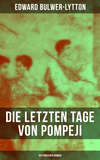Kitabı oku: «Athens: Its Rise and Fall, Complete», sayfa 23
CHAPTER IV
The Preparations of Darius.—Revolt of Egypt.—Dispute for the Succession to the Persian Throne.—Death of Darius.—Brief Review of the leading Events and Characteristics of his Reign.
I. While, under the presiding genius of Themistocles, Athens was silently laying the foundation of her naval greatness, and gradually increasing in influence and renown, the Persian monarch was not forgetful of the burning of Sardis and the defeat of Marathon. The armies of a despotic power are often slow to collect, and unwieldy to unite, and Darius wasted three years in despatching emissaries to various cities, and providing transports, horses, and forage for a new invasion.
The vastness of his preparations, though congenial to oriental warfare, was probably proportioned to objects more great than those which appear in the Greek historians. There is no reason, indeed, to suppose that he cherished the gigantic project afterward entertained by his son—a project no less than that of adding Europe as a province to the empire of the East. But symptoms of that revolt in Egypt which shortly occurred, may have rendered it advisable to collect an imposing force upon other pretences; and without being carried away by any frantic revenge against the remote and petty territory of Athens, Darius could not but be sensible that the security of his Ionian, Macedonian, and Thracian conquests, with the homage already rendered to his sceptre by the isles of Greece, made it necessary to redeem the disgrace of the Persian arms, and that the more insignificant the foe, the more fatal, if unpunished, the example of resistance. The Ionian coasts—the entrance into Europe—were worth no inconsiderable effort, and the more distant the provinces to be awed, the more stupendous, according to all rules of Asiatic despotism, should appear the resources of the sovereign. He required an immense armament, not so much for the sake of crushing the Athenian foe, as of exhibiting in all its might the angry majesty of the Persian empire.
II. But while Asia was yet astir with the martial preparations of the great king, Egypt revolted from his sway, and, at the same time, the peace of Darius was imbittered, and his mind engaged, by a contest among his sons for the succession to the crown (B. C. 486). Artabazanes, the eldest of his family, born to him by his first wife, previous to his own elevation to the throne, founded his claim upon the acknowledged rights of primogeniture; but Xerxes, the eldest of a second family by Atossa, daughter of the great Cyrus, advanced, on the other hand, a direct descent from the blood of the founder of the Persian empire. Atossa, who appears to have inherited something of her father’s genius, and who, at all events, exercised unbounded influence over Darius, gave to the claim of her son a stronger support than that which he could derive from argument or custom. The intrigue probably extended from the palace throughout the pure Persian race, who could not but have looked with veneration upon a descendant of Cyrus, nor could there have seemed a more popular method of strengthening whatever was defective in the title of Darius to the crown, than the transmission of his sceptre to a son, in whose person were united the rights of the new dynasty and the sanctity of the old. These reasonings prevailed with Darius, whose duty it was to nominate his own successor, and Xerxes was declared his heir. While the contest was yet undecided, there arrived at the Persian court Demaratus, the deposed and self-exiled king of Sparta. He attached himself to the cause and person of Xerxes, and is even said to have furnished the young prince with new arguments, founded on the usages of Sparta—an assertion not to be wholly disregarded, since Demaratus appeared before the court in the character of a monarch, if in the destitution of an exile, and his suggestions fell upon the ear of an arbiter willing to seize every excuse to justify the resolution to which he had already arrived.
This dispute terminated, Darius in person prepared to march against the Egyptian rebels, when his death (B. C. 485) consigned to the inexperienced hands of his heir the command of his armies and the execution of his designs.
The long reign of Darius, extending over thirty-six years, was memorable for vast improvements in the administrations of the empire, nor will it, in this place, be an irrelevant digression to glance briefly and rapidly back over some of the events and the innovations by which it was distinguished.
III. The conquest of Cyrus had transplanted, as the ruling people, to the Median empire, a race of brave and hardy, but simple and uncivilized warriors. Cambyses, of whose character no unequivocal evidence remains, since the ferocious and frantic crimes ascribed to him 38 are conveyed to us through the channel of the Egyptian priests, whom he persecuted, most probably, rather as a political nobility than a religious caste, could but slightly have improved the condition of the people, or the administration of the empire, since his reign lasted but seven years and five months, during which he was occupied with the invasion of Africa and the subjugation of Egypt. At the conclusion of his reign he was menaced by a singular conspiracy. The Median magi conspired in his absence from the seat of empire to elevate a Mede to the throne. Cambyses, under the impulse of jealous and superstitious fears, had lately put to death Smerdis, his brother. The secret was kept from the multitude, and known only to a few—among others, to the magian whom Cambyses had intrusted with the charge of his palace at Susa, an office as important as confidential. This man conceived a scheme of amazing but not unparalleled boldness. His brother, a namesake of the murdered prince, resembled the latter also in age and person. This brother, the chief of the household, with the general connivance of his sacerdotal caste, who were naturally anxious to restore the Median dynasty, suddenly declared to be the true Smerdis, and the impostor, admitted to possession of the palace, asserted his claim to the sovereign power. The consent of the magi— the indifference of the people—the absence, not only of the king, but of the flower of the Persian race—and, above all, the tranquil possession of the imperial palace, conspired to favour the deceit. 39 Placed on the Persian throne, but concealing his person from the eyes of the multitude in the impenetrable pomp of an Oriental seraglio, the pseudo Smerdis had the audacity to despatch, among the heralds that proclaimed his accession, a messenger to the Egyptian army, demanding their allegiance. The envoy found Cambyses at Ecbatana in Syria. Neither cowardice nor sloth was the fault of that monarch; he sprang upon his horse, determined to march at once to Susa, when the sheath fell from his sword, and he received a mortal wound from the naked blade. Cambyses left no offspring, and the impostor, believed by the people to be the true son of Cyrus, issued, from the protecting and august obscurity of his palace, popular proclamations and beneficent edicts. Whatever his present fraud, whatever his previous career, this daring Mede was enabled to make his reign beloved and respected. After his death he was regretted by all but the Persians, who would not have received the virtues of a god as an excuse for the usurpation of a Mede. Known to the vast empire only by his munificence of spirit—by his repeal of tribute and service, the impostor permitted none to his presence who could have detected the secret. He never quitted his palace—the nobles were not invited to his banquets—the women in his seraglio were separated each from each—and it was only in profound darkness that the partners of his pleasures were admitted to his bed. The imposture is said by Herodotus to have been first discovered in the following manner:—the magian, according to the royal custom, had appropriated to himself the wives of Cambyses; one of these was the daughter of Otanes, a Persian noble whom the secluded habits of the pretended king filled with suspicion. For some offence, the magian had been formerly deprived of his ears by the order of Cyrus. Otanes communicated this fact, with his suspicions, to his daughter, and the next time she was a partaker of the royal couch, she took the occasion of his sleep to convince herself that the sovereign of the East was a branded and criminal impostor. The suspicions of Otanes verified, he entered, with six other nobles, into a conspiracy, which mainly owed its success to the resolution and energy of one among them, named Darius, who appears to have held a station of but moderate importance among the royal guard, though son of Hystaspes, governor of the province of Persis, and of the purest and loftiest blood of Persia. The conspirators penetrated the palace unsuspected—put the eunuchs who encountered them to death —and reached the chamber in which the usurper himself was seated with his brother. The impostors, though but imperfectly armed, defended themselves with valour; two of the conspirators were wounded, but the swords of the rest sufficed to consummate the work, and Darius himself gave the death-blow to one of the brothers.
This revolution was accompanied and stained by an indiscriminate massacre of the magi. Nor did the Persians, who bore to that Median tribe the usual hatred which conquerors feel to the wisest and noblest part of the conquered race, content themselves with a short-lived and single revenge. The memory of the imposture and the massacre was long perpetuated by a solemn festival, called “the slaughter of the Magi,” or Magophonia, during which no magian was permitted to be seen abroad.
The result of this conspiracy threw into the hands of the seven nobles the succession to the Persian throne: the election fell upon Darius, the soul of the enterprise, and who was of that ancient and princely house of the Achaemenids, in which the Persians recognised the family of their ancestral kings. But the other conspirators had not struggled solely to exchange one despot for another. With a new monarchy arose a new oligarchy. Otanes was even exempted from allegiance to the monarch, and his posterity were distinguished by such exclusive honours and immunities, that Herodotus calls them the only Persian family which retained its liberty. The other conspirators probably made a kind of privileged council, since they claimed the right of access at all hours, unannounced, to the presence of the king—a privilege of the utmost value in Eastern forms of government—and their power was rendered permanent and solid by certain restrictions on marriage 40, which went to maintain a constant alliance between the royal family and their own. While the six conspirators rose to an oligarchy, the tribe of the Pasargadae— the noblest of those sections into which the pure Persian family was divided—became an aristocracy to officer the army and adorn the court. But though the great body of the conquered Medes were kept in subject inferiority, yet the more sternly enforced from the Persian resentment at the late Median usurpation, Darius prudently conciliated the most powerful of that great class of his subjects by offices of dignity and command, and of all the tributary nations, the Medes ranked next to the Persians.
IV. With Darius, the Persian monarchy progressed to that great crisis in the civilization of those states founded by conquering Nomades, when, after rich possessions are seized, cities built, and settlements established, the unwieldy and enormous empire is divided into provinces, and satrap government reflects in every district the mingled despotism and subservience, pomp and insecurity, of the imperial court. Darius undoubtedly took the most efficient means in his power to cement his sway and organize his resources. For the better collection of tribute, twenty provinces were created, governed by twenty satraps. Hitherto no specific and regular tax had been levied, but the Persian kings had been contented with reluctant presents, or arbitrary extortions. Darius now imposed a limited and annual impost, amounting, according to the computation of Herodotus, to fourteen thousand five hundred and sixty talents, collected partially from Africa, principally from Asia 41. The Persians, as the conquering and privileged race, were excluded from the general imposition, but paid their moderate contribution under the softer title of gratuity. The Colchians fixed their own burdens—the Ethiopians that bordered Egypt, with the inhabitants of the sacred town of Nyssa, rendered also tributary gratuities—while Arabia offered the homage of her frankincense, and India 42 of her gold. The empire of Darius was the more secure, in that it was contrary to its constitutional spirit to innovate on the interior organization of the distant provinces—they enjoyed their own national laws and institutions—they even retained their monarchs—they resigned nothing but their independence and their tribute. The duty of the satraps was as yet but civil and financial: they were responsible for the imposts, they executed the royal decrees. Their institution was outwardly designed but for the better collection of the revenue; but when from the ranks of the nobles Darius rose to the throne, he felt the advantage of creating subject principalities, calculated at once to remove and to content the more powerful and ambitious of his former equals. Save Darius himself, no monarch in the known world possessed the dominion or enjoyed the splendour accorded to these imperial viceroys. Babylon and Assyria fell to one—Media was not sufficient for another—nation was added to nation, and race to race, to form a province worthy the nomination of a representative of the great king. His pomp and state were such as befitted the viceroy over monarchs. A measure of silver, exceeding the Attic medimnus, was presented every day to the satrap of Babylon 43. Eight hundred stallions and sixteen thousand mares were apportioned to his stables, and the tax of four Assyrian towns was to provide for the maintenance of his Indian dogs.
But under Darius, at least, these mighty officers were curbed and kept in awe by the periodical visits of the king himself, or his commissioners; while a broad road, from the western coast to the Persian capital—inns, that received the messengers, and couriers, that transmitted the commands of the king, brought the more distant provinces within the reach of ready intelligence and vigilant control. These latter improvements were well calculated to quicken the stagnant languor habitual to the overgrowth of eastern empire. Nor was the reign of Darius undistinguished by the cultivation of the more elegant arts—since to that period may be referred, if not the foundation, at least the embellishment and increase of Persepolis. The remains of the palace of Chil-Menar, ascribed by modern superstition to the architecture of genii, its graceful columns, its mighty masonry, its terrace-flights, its marble basins, its sculptured designs stamped with the unmistakeable emblems of the magian faith, sufficiently evince that the shepherd-soldiery of Cyrus had already learned to appreciate and employ the most elaborate arts of the subjugated Medes.
During this epoch, too, was founded a more regular military system, by the institution of conscriptions—while the subjection of the skilful sailors of Phoenicia, and of the great maritime cities of Asiatic Greece, brought to the Persian warfare the new arm of a numerous and experienced navy.
V. The reign of Darius is also remarkable for the influence which Grecian strangers began to assume in the Persian court—and the fatal and promiscuous admission of Grecian mercenaries into the Persian service. The manners of the Persians were naturally hospitable, and Darius possessed not only an affable temper, but an inquisitive mind. A Greek physician of Crotona, who succeeded in relieving the king from the effects of a painful accident which had baffled the Egyptian practitioners, esteemed the most skilful the court possessed, naturally rose into an important personage. His reputation was increased by a more difficult cure upon the person of Atossa, the daughter of Cyrus, who, from the arms of her brother Cambyses, and those of the magian impostor, passed to the royal marriage-bed. And the physician, though desirous only of returning through some pretext to his own country, perhaps first inflamed the Persian king with the ill-starred wish of annexing Greece to his dominions. He despatched a commission with the physician himself, to report on the affairs of Greece. Many Hellenic adventurers were at that time scattered over the empire, some who had served with Cambyses, others who had sided with the Egyptians. Their valour recommended them to a valiant people, and their singular genius for intrigue took root in every soil. Syloson, a Greek of Samos, brother to Polycrates, the tyrant of that state, who, after a career of unexampled felicity and renown, fell a victim to the hostile treachery of Oretes, the satrap of Sardis, induced Darius to send over Otanes at the head of a Persian force to restore him to the principality of his murdered brother; and when, subsequently, in his Scythian expedition, Darius was an eyewitness of the brilliant civilization of Ionia, not only did Greece become to him more an object of ambition, but the Greeks of his respect. He sought, by a munificent and wise clemency, to attach them to his throne, and to colonize his territories with subjects valuable alike for their constitutional courage and national intelligence. Nor can we wonder at the esteem which a Hippias or a Demaratus found in the Persian councils, when, in addition to the general reputation of Greeks, they were invested with the dignity of princely rank—for, above all nations 44, the Persians most venerated the name and the attributes of a king; nor could their Oriental notions have accurately distinguished between a legitimate monarch and a Greek tyrant.
VI. In this reign, too, as the empire was concentrated, and a splendid court arose from the warrior camp of Cyrus and Cambyses, the noble elements of the pure Persian character grew confounded with the Median and Assyrian. As the Persians retreated from the manners of a nomad, they lost the distinction of a conquering people. Warriors became courtiers—the palace shrunk into the seraglio—eunuchs and favourites, queens 45, and above all queen-mothers, rose into pernicious and invisible influence. And while the Greeks, in their small states, and under their free governments, progressed to a civilization, in which luxury only sharpened new energies and created new arts, the gorgeous enervation of a despotism destructive to competition, and an empire too vast for patriotism, rapidly debased and ruined the old hardy race of Cyrus 46, perhaps equal originally to the Greeks in mental, and in many important points far superior to them in moral qualities. With a religion less animated and picturesque, but more simple and exalted, rejecting the belief that the gods partook of a mortal nature, worshipping their GREAT ONE not in statues or in temples, but upon the sublime altar of lofty mountain-tops—or through those elementary agents which are the unidolatrous representatives of his beneficence and power 47; accustomed, in their primitive and uncorrupted state, to mild laws and limited authority; inured from childhood to physical discipline and moral honesty, “to draw the bow and to speak the truth,” this gallant and splendid tribe were fated to make one of the most signal proofs in history, that neither the talents of a despot nor the original virtues of a people can long resist the inevitable effect of vicious political constitutions. It was not at Marathon, nor at Salamis, nor at Plataea, that the Persian glory fell. It fell when the Persians imitated the manners of the slaves they conquered. “Most imitative of all men,” says Herodotus, “they are ever ready to adopt the manners of the foreigners. They take from the Medes their robe, from the Egyptians their breastplate.” Happy, if to the robe and the breastplate they had confined their appropriations from the nations they despised! Happy, if they had not imparted to their august religion the gross adulterations of the Median magi; if they had not exchanged their mild laws and restricted government, for the most callous contempt of the value of life 48 and the dignity of freedom. The whole of the pure Persian race, but especially the nobler tribe of the Pasargadae, became raised by conquest over so vast a population, to the natural aristocracy of the land. But the valuable principle of aristocratic pride, which is the safest curb to monarchic encroachment, crumbled away in the atmosphere of a despotism, which received its capricious checks or awful chastisement only in the dark recesses of a harem. Retaining to the last their disdain of all without the Persian pale; deeming themselves still “the most excellent of mankind;” 49 this people, the nobility of the East, with the arrogance of the Spartan, contracting the vices of the Helot, rapidly decayed from all their national and ancient virtues beneath that seraglio-rule of janizaries and harlots, in which, from first to last, have merged the melancholy destinies of Oriental despotism.
VII. Although Darius seems rather to have possessed the ardour for conquest than the genius for war, his reign was memorable for many military triumphs, some cementing, others extending, the foundations of the empire. A formidable insurrection of Babylon, which resisted a siege of twenty-one months, was effectually extinguished, and the new satrap government, aided by the yearly visits of the king, appears to have kept from all subsequent reanimation the vast remains of that ancient empire of the Chaldaean kings. Subsequently an expedition along the banks of the Indus, first navigated for discovery by one of the Greeks whom Darius took into his employ, subjected the highlands north of the Indus, and gave that distant river as a new boundary to the Persian realm. More important, had the fortunes of his son been equal to his designs, was the alarming settlement which the monarch of Asia effected on the European continent, by establishing his sovereignty in Thrace and Macedonia—by exacting homage from the isles and many of the cities of Greece—by breaking up, with the crowning fall of Miletus, the independence and rising power of those Ionian colonies, which ought to have established on the Asiatic coasts the permanent barrier to the irruptions of eastern conquest. Against these successes the loss of six thousand four hundred men at the battle of Marathon, a less number than Darius deliberately sacrificed in a stratagem at the siege of Babylon, would have seemed but a petty counterbalance in the despatches of his generals, set off, as it was, by the spoils and the captives of Euboea. Nor were the settlements in Thrace and Macedon, with the awe that his vast armament excited throughout that portion of his dominions, an insufficient recompense for the disasters of the expedition, conducted by Darius in person, against the wandering, fierce, and barbarous Mongolian race, that, known to us by the name of Scythians, worshipped their war-god under the symbol of a cimeter, with libations of human blood—hideous inhabitants of the inhospitable and barren tracts that interpose between the Danube and the Don.
VIII. Thus the heritage that passed from Darius to Xerxes was the fruit of a long and, upon the whole, a wise and glorious reign. The new sovereign of the East did not, like his father, find a disjointed and uncemented empire of countries rather conquered than subdued, destitute alike of regular revenues and local governments; a wandering camp, shifted to and fro in a wilderness of unconnected nations— Xerxes ascended the throne amid a splendid court, with Babylon, Ecbatana, Persepolis, and Susa for his palaces. Submissive satraps united the most distant provinces with the seat of empire. The wealth of Asia was borne in regular currents to his treasury. Save the revolt of the enfeebled Egyptians, and the despised victory of a handful of men upon a petty foreland of the remote Aegaean, no cloud rested upon the dawn of his reign. As yet unfelt and unforeseen were the dangers that might ultimately result from the very wisdom of Darius in the institution of satraps, who, if not sufficiently supported by military force, would be unable to control the motley nations over which they presided, and, if so supported, might themselves become, in any hour, the most formidable rebels. To whatever prestige he inherited from the fame of his father, the young king added, also, a more venerable and sacred dignity in the eyes of the Persian aristocracy, and, perhaps, throughout the whole empire, derived, on his mother’s side, from the blood of Cyrus. Never, to all external appearance, and, to ordinary foresight, under fairer auspices, did a prince of the East pass from the luxury of a seraglio to the majesty of a throne.










